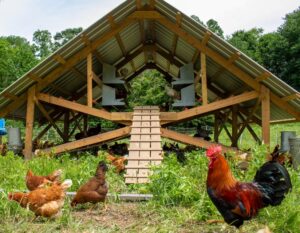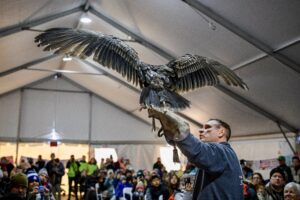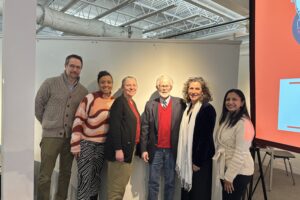
The modern commercial egg farm can be a ghastly place. Chickens in these settings are typically crammed into 12”-x-12” individual cages and denied any semblance of a natural life. These egg factories are inhumane, pollute the environment, and produce eggs with sub-par nutrition.
This was never an option at Fable Farms in Ossining.
Years ago, its farmers set out to put chickens on pasture, where they could live in a natural setting and participate in their complex social networks, forage for insects and plants, dustbathe, and do all of the other things that makes a chicken a chicken.
***
But there were a few problems. These coops couldn’t be moved; meaning that over time the chickens were polluting their pasture with too much manure and scraping the land dry of bugs and plants. The coops also lacked security and as such Fable was experiencing predator pressure by skunks, racoons, and coyotes.
It was time for Fable to make a new plan. But first, it needed the help of the community.
In November 2020, Fable set an ambitious goal of raising $10,000 from the community to create a humane and sustainable egg operation.
In the months that followed, the community’s generosity allowed Fable to purchase and brood a flock of 260 chicks in one of its greenhouses, and to build the structure that makes this operation special: the Millenium Feathernet.
***
The Millenium Feathernet is a design by Joel Salatin of Polyface Farm. The design is a sturdy open-air A-frame structure that allows for mobility, ventilation, and protection from the sun and predators.
Each week, the Feathernet is moved to a new patch of pasture, where the chickens can forage for new insects and plants. This system provides many benefits: the chickens eat a natural pasture
diet and pass on that superior nutrition to the eggs; food and labor costs are reduced; and the Feathernet is never on a patch of land long enough to pollute it.
The flock is protected by a state-of-the-art electric fence to prevent predators from entering the coop.
After the flock leaves an area, new pasture seed is spread, and the newly fertilized pasture regrows stronger than before. While many modern egg-producing operations leave the land polluted and barren, this system leaves the land better than it was found. As the system is no-till, it sequesters massive amounts of carbon into the soil, helping our community do its part in the fight against climate change.
Fable: From Farm to Table, 1311 Kitchawan Rd, Ossining NY 10562; fablefoods.com






